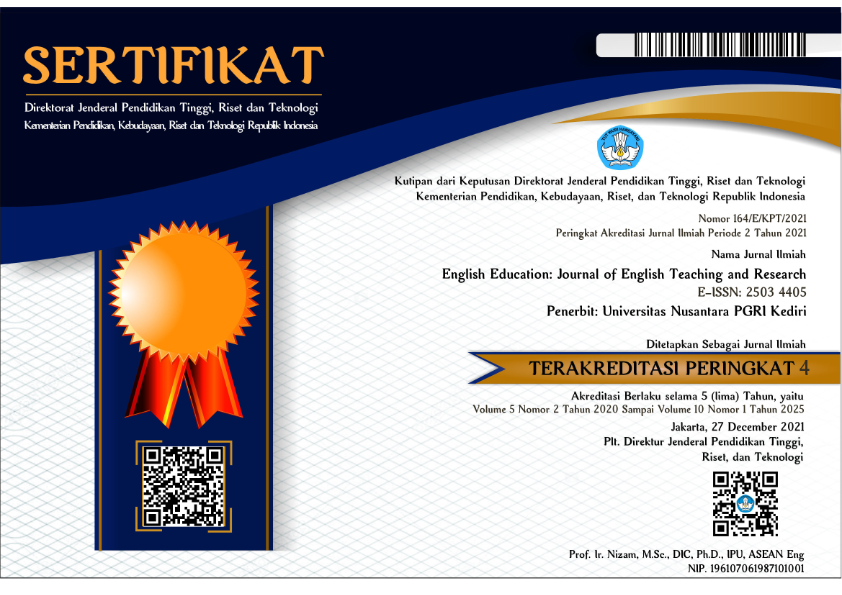PRAGMATICS IN EFL CLASSROOM: AVOIDING PRAGMATIC FAILURE IN CROSS-CULTURAL COMMUNICATION
DOI:
https://doi.org/10.29407/jetar.v5i1.14310Keywords:
Pragmatic failure, EFL classroom, cross cultural communication.Abstract
In teaching language along with its culture, teacher should take pragmatic aspects into consideration, since understanding pragmatics will help foreign language learners to avoid false interpretation which will cause misunderstanding in communication between speakers with different culture and social backgrounds. It is called as pragmatic failure which usually takes place in cross-cultural communication. Since pragmatics plays quite important role in communication, it is important for foreign language learners to have sensitivity of cross cultural pragmatics, which is commonly known as cross cultural or intercultural pragmatic awareness. However, teaching language along with culture seems to be problematic, since it is relatively difficult to choose which aspect(s) of culture to teach, what content to include, and to represent cultures implicitly under study which presents differences from the norm of students’ local culture. Therefore, this paper tries to explore the essential issues of spoken discourse, pragmatics, cross cultural pragmatics, pragmatic failure, pragmatic awareness, and its implication to pedagogy.
Downloads
References
Alinezhad, A. (2015).The significance of pragmatics in English language teaching. ELT Voices - India’ International Journal for Teachers of English, 5, 19-24. Retrieved on April 26, 2020, from http://www.eltvoices.in
Carston, R. (2002). Toughts and utterances: The pragmatics of explicit communication. Oxford: Blackwell.
Christiansen, T. (2015). The rise of Englishas the global lingua franca: Isthe world heading towards greatermonolingualism or new forms ofplurilingualism?.Journal Lingue eLinguanggi, 15, 129-154.
Cutting, J. (2011). Spoken Discourse. In K. Hyland, & B. Paltridge. (Ed.), The continuum companion to discourse analysis (pp. 155-170). London: Continuum.
Flowerdew, J. (2013). Discourse in English language education. New York: Routledge
Fujiwara, Y. (2004). An intercultural pragmatics study on japanese resistivity and american acceptability in refusals. Intercultural Communication Studies, XIII: 2, 75-99. Retrieved on December 12, 2019, from https://pdfs.semanticscholar.org/5390/69f9f10eeb8291a8b5631455a5ade2e61e43.pdf
Gee, J. P. (2011). How to do discourse analysis: A toolkit. New York: Routledge.
Grice, H. P. (1998). Studies in the way of words.Cambridge: Harvard University Press.
Griffiths, P. (2006). An introduction to English semantics and pragmatics. Edinburgh: Edinburgh University Press.
Hammond, J. (2011). Classroom Discourse. K. Hyland, & B. Paltridge, B (Ed), Continuum companion to discourse analysis (pp. 291-304). London: Continuum International Publishing Group.
Jie, F. (2010). A study on pragmatic failure in cross-cultural communication. Sino-US English Teaching, 7, 42-46. Retrieved on December 12, 2019, from https://files.eric.ed.gov/fulltext/ED514800.pdf
Kawar, T. I. (2012). Cross Cultural Differences in Management. International Journal of Business and Social Science, 3, 105-111. Retrieved on December 12, 2019, from https://ijbssnet.com/journals/Vol_3_No_6_Special_Issue_March_2012/13.pdf
Kementerian Pendidikan dan Kebudayaan. (2018). Peraturan Menteri Pendidikan dan Kebudayaan Republik Indonesia Nomor 37 Tahun 2018 tentang Kurikulum 2013 Sekolah Menengah Atas/Madrasah Aliyah
Knutson, E. M. (2006). Cross-Cultural Awareness for Second/Foreign Language Learners. The Canadian Modern Language Review, 62, 591-610.Retrieved on December 12, 2019, from http://faculty.weber.edu/cbergeson/516/knutson.pdf
Koksal, D. (n.d.). Pragmatic approach to cross-cultural communication in the business world. [Online] Available: http://www.opf.slu.cz/vvr/akce/turecko/pdf/Koksal.pdf(December, 12, 2019)
MA, N. D. (2013).The role of Pragmatics in English language teaching: Pragmatic competence. Academic Journal of Interdisciplinary Studies, 4, 63-70.
Matthews, L. C. & Thakkar, B. (2012). The Impact of Globalization on Cross- Cultural Communication. [Online] Available: http://cdn.intechopen.com/pdfs-wm/38267.pdf (December, 12, 2019)
Moeschler, J. (2004). Intercultural pragmatics: A cognitive approach. Intercultural Pragmatics,1, 49–70.Retrieved on December 12, 2019, from https://www.researchgate.net/publication/269615377_Intercultural_pragmatics_A_cognitive_approach
Rasekh, Z. (2005). Raising the pragmatic awareness of Language Learners. ELT Journal, 59, 199-208. Retrieved on April 26, 2020, from https://www.researchgate.net/publication/31433206
Schauer, G. A. (2009). Interlanguage pragmatic development: The study abroad context. London: Continuum.
Downloads
Published
Issue
Section
License
Authors who publish with this journal agree to the following terms:
- Copyright on any article is retained by the author(s).
- The author grants the journal, the right of first publication with the work simultaneously licensed under a Creative Commons Attribution License that allows others to share the work with an acknowledgment of the work’s authorship and initial publication in this journal.
- Authors are able to enter into separate, additional contractual arrangements for the non-exclusive distribution of the journal’s published version of the work (e.g., post it to an institutional repository or publish it in a book), with an acknowledgment of its initial publication in this journal.
- Authors are permitted and encouraged to post their work online (e.g., in institutional repositories or on their website) prior to and during the submission process, as it can lead to productive exchanges, as well as earlier and greater citation of published work.
- The article and any associated published material is distributed under the Creative Commons Attribution-ShareAlike 4.0 International License








 Article template
Article template



